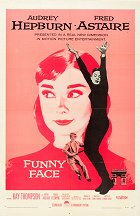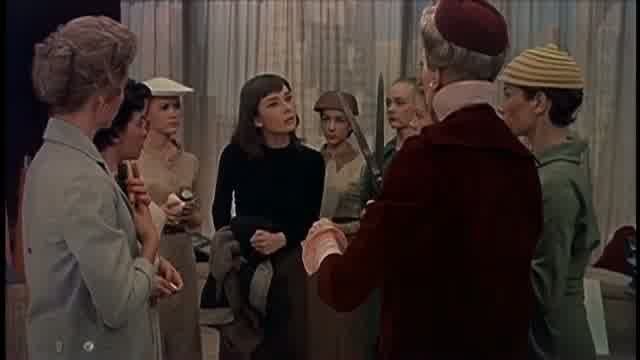Directed by:
Stanley DonenScreenplay:
Leonard GersheCinematography:
Ray JuneCast:
Audrey Hepburn, Fred Astaire, Kay Thompson, Michel Auclair, Robert Flemyng, Dovima, Suzy Parker, Sunny Hartnett, Jean Del Val, Virginia Gibson, Sue England (more)VOD (2)
Plots(1)
In the Manhattan offices of Quality Magazine , editor Maggie Prescott and her band of assistants brainstorm to come up with an inspirational theme for the latest issue of their fashion publication. Maggie decides that the color pink will be it, and soon offices, buses and even airplanes are being painted that color. While all America is being outfitted in pink, Maggie, still in her gray business suit, decides that her next issue will be dedicated to "clothes for the woman who isn't interested in clothes." In his studio, photographer Dick Avery is having little luck in capturing Maggie's concept, so they decide to change locations and do the fashion shoot inside a bohemian Greenwich Village bookstore. Never one to stand on formality, Maggie and her troupe proceed to take over Emery's Concepts Bookstore, going so far as to lock Jo Stockton, the store's clerk, out of the shop. As the bookstore is in shambles following the photographic session, Dick stays behind to help Jo pick things up. The two soon begin talking about Paris, but while Dick extols the beauty of the French city, Jo tells him that she wishes to go there merely to meet philosopher, Prof. Emile Flostre. Later, Maggie decides to create "the Quality Woman," a model who will have a collection of clothes designed especially for her by the noted couturier, Paul Duval. Dick suggests Jo, but neither she nor Maggie are initially enthusiastic about his idea, until Jo learns that the job will entail a trip to Paris. As soon as they arrive in France, Jo, Dick and Maggie split up to secretly do some sightseeing, only to run into each other at the Eiffel Tower. Later, when Jo misses her first costume fitting, Dick finds her in a bohemian café, and angers her by pointing out that her fellow philosophers have only been listening to her because she has been paying for their drinks. The two soon make up, and the next day, after hours of hair and makeup in Duval's salon, Jo is transformed from a plain bookworm into a high-fashion butterfly. For the next week, Dick and Jo travel throughout Paris, as he photographs her in Duval's new collection at such historical locales as the Louvre Museum. Overcome with emotion during the final shoot, in which she finds herself wearing a wedding gown before a small, country church, Jo professes her love to Dick, and though the older photographer is surprised, he admits he feels the same way toward her. Later, back at Duval's salon, Maggie coaches Jo on how to act during the upcoming fashion show, with particular emphasis on how the young girl should handle the press. The night before the show, however, Jo learns that Flostre is appearing at the café, and is completely overwhelmed upon first meeting the handsome, young French philosopher. Dick then embarrasses Jo by dragging her out of the café, arguing that Flostre is more interested in her body than her mind. Jo and Dick continue their fighting backstage at Maggie's press party, with disastrous results. Now the laughing stock of all Paris, Dick, Maggie and Duval face financial ruin if the missing Jo does not appear at the fashion show. Disguised as beatnik folk singers from Florida, Dick and Maggie crash Flostre's party, where they are required to perform a spiritual. After a brief skirmish with Flostre, a frustrated Dick announces he is leaving both Jo and Paris to return to New York. Soon thereafter, Flostre attempts to make love to Jo, and the disillusioned girl rushes out of his house, arriving at Duval's salon just in time to appear in the fashion show. Meanwhile, Maggie tries to stop Dick from leaving France, but is unable to catch him either at his hotel or at the airport. Dick, however, meets Flostre as they board the same plane, and upon learning that Jo rejected the Frenchman, Dick rushes back to Duval's. Told that Jo has already left the show, Maggie suggests that Dick use Flostre's philosophy of empathy to ascertain where she has gone. Dick then rushes to the country church, where he finds Jo, still wearing Duval's wedding dress, and the two lovers are once and for all united. (official distributor synopsis)
(more)Videos (4)
Reviews (1)
An almost incomprehensible piece. A playful musical, a parody of the fashion industry, or an ode to Paris? It's hard to judge. There are too many clichés layered one on top of the other, as well as the overripe Astaire and the supposedly well-liked Audrey. It's not good. The transformation of the funny-faced intellectual into a world-class model simply isn't going to happen, although she would like it to... Or maybe the people at that magazine could be happy for a change. Be that as it may, the short career of this icon, who looked different from generations before her (and only by doing so should have become immortal), thankfully soon fizzled out.
()


